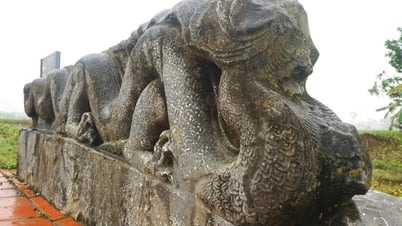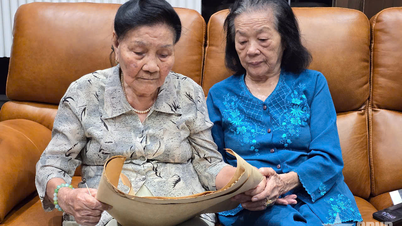Wind go fast
Mom is drying straw
For cattle to eat
Cold days.
The sun is hot
Curved shaft
Love you mom so much
Afternoon wind me
I was still a child
Not helped yet
Wind accepted to go
let me have fun
Wind oh wind
Nguyen Van Thanh

Love mother endlessly
Reading the poem “Calling the Wind” by poet Nguyen Van Thanh, I imagine the scene of a hot afternoon, a mother is diligently drying straw in the yard, in the middle of the road, a child about 5, 6 years old is in the shade of a tree but can’t sit still because he is anxious for his mother. He is trying every way within his ability to help his mother reduce some of the hardship. That picture is innocent, lovely but has the power to strongly move the reader’s soul, because it has touched the childhood memories of many people.
Calling the wind, which adults will understand is useless, with the funny thinking and innocent soul of the child in the poem, is the most practical thing to do right now to help his mother dispel the heat.
Wind oh wind
Wind comes to me
Wipe away sweat
Wet mother's forehead
The phrase “Gio oi” is repeated twice, accurately describing the child’s hasty way of speaking, but also expressing the child’s anxious state of mind when witnessing his mother’s bruised face and sweat dripping down her forehead. The child’s request to wipe away the sweat shows the mother’s hardships and at the same time shows the child’s filial piety. It is the understanding of the mother’s hardships and the heart that loves her mother endlessly.
The baby's emotional range was pushed higher when he said:
Wind go fast
Mom is drying straw
For cattle to eat
Cold rainy days
Understanding the meaning of what her mother was doing, understanding the harshness of the weather: The sun is burning hot/ The handle is bent, so the child confided his feelings to the wind: I love you so much, mother/ Wind, please come to me/ I'm still young/ I can't help you yet. It's because the child is too young to help his mother, not because he's afraid of the sun or lazy to help, wind. So, the child innocently hoped to receive sympathy from the inanimate wind, which he thought was a living being with a soul, knowing how to sympathize and share like a human being. The words of explanation were so pitiful and touching, they could only be written by a pen that understood children and had boundless love for them.
The love for his mother and the anxiety that reached its peak urged the child to do everything he could just to pray for the wind to come and dispel the scorching heat that his mother was suffering. This was shown when the child changed his tone to a pleading state: "Wind, please come this afternoon" and the wind agreed. Then finally he repeated the refrain "Wind, oh wind, oh" as a most sincere plea.
The verses with a whispering, gentle tone but full of emotions, depict the depth of the mood of a child at the age of innocence, naive but knowing how to observe and feel everything around, knowing how to love and care for others. The author has transformed into the character completely, excellently and delicately, creating a short poem but leaving a deep impression in the reader's heart about the humanity and filial piety of people.
Source


![[Photo] Prime Minister Pham Minh Chinh receives the President of Asia-Pacific region of PowerChina Group](https://vphoto.vietnam.vn/thumb/1200x675/vietnam/resource/IMAGE/2025/5/21/0f4f3c2f997b4fdaa44b60aaac103d91)

![[Photo] Coming to Son La, let's "show off" with the Wallflowers](https://vphoto.vietnam.vn/thumb/1200x675/vietnam/resource/IMAGE/2025/5/21/627a654c41fc4e1a95f3e1c353d0426d)
![[Photo] Prime Minister Pham Minh Chinh receives Rabbi Yoav Ben Tzur, Israeli Minister of Labor](https://vphoto.vietnam.vn/thumb/1200x675/vietnam/resource/IMAGE/2025/5/21/511bf6664512413ca5a275cbf3fb2f65)

![[Photo] Scientific workshop "Building a socialist model associated with socialist people in Hai Phong city in the period of 2025-2030 and the following years"](https://vphoto.vietnam.vn/thumb/1200x675/vietnam/resource/IMAGE/2025/5/21/5098e06c813243b1bf5670f9dc20ad0a)





















































































Comment (0)